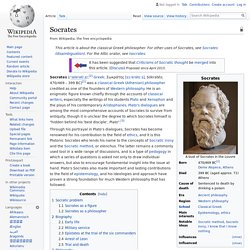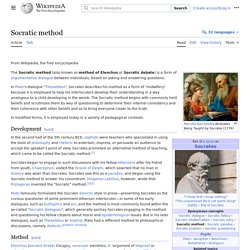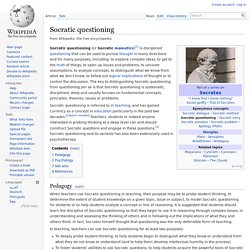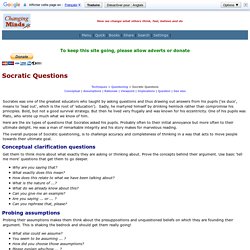

PLENK10: Socratic questions about PLENK. Socrates. Socrates (/ˈsɒkrətiːz/;[2] Greek: Σωκράτης [sɔːkrátɛːs], Sōkrátēs; 470/469 – 399 BC)[1] was a classical Greek (Athenian) philosopher credited as one of the founders of Western philosophy.

He is an enigmatic figure known chiefly through the accounts of classical writers, especially the writings of his students Plato and Xenophon and the plays of his contemporary Aristophanes. Plato's dialogues are among the most comprehensive accounts of Socrates to survive from antiquity, though it is unclear the degree to which Socrates himself is "hidden behind his 'best disciple', Plato".[3] Through his portrayal in Plato's dialogues, Socrates has become renowned for his contribution to the field of ethics, and it is this Platonic Socrates who lends his name to the concepts of Socratic irony and the Socratic method, or elenchus.
Socratic problem Nothing written by Socrates remains extant. Socrates as a figure Socrates as a philosopher Biography Early life Military service Arrest of Leon Trial and death Notes. Socratic method. Type of dialog or debate The Socratic method is a method of hypothesis elimination, in that better hypotheses are found by steadily identifying and eliminating those that lead to contradictions.

The Socratic method searches for general, commonly held truths that shape beliefs and scrutinizes them to determine their consistency with other beliefs. The basic form is a series of questions formulated as tests of logic and fact intended to help a person or group discover their beliefs about some topic; exploring definitions, and seeking to characterize general characteristics shared by various particular instances.
Development[edit] In the second half of the 5th century BC, sophists were teachers who specialized in using the tools of philosophy and rhetoric to entertain, impress, or persuade an audience to accept the speaker's point of view. Method[edit] Elenchus (Ancient Greek: ἔλεγχος, romanized: elenkhos, lit. W. Application[edit] Socratic questioning. Socratic questioning (or Socratic maieutics)[1] is disciplined questioning that can be used to pursue thought in many directions and for many purposes, including: to explore complex ideas, to get to the truth of things, to open up issues and problems, to uncover assumptions, to analyze concepts, to distinguish what we know from what we don't know, to follow out logical implications of thought or to control the discussion.

The key to distinguishing Socratic questioning from questioning per se is that Socratic questioning is systematic, disciplined, deep and usually focuses on fundamental concepts, principles, theories, issues or problems. Socratic questioning is referred to in teaching, and has gained currency as a concept in education particularly in the past two decades. Pedagogy[edit] In teaching, teachers can use Socratic questioning for at least two purposes: Socratic questioning. Socratic questioning. Socratic questioning. Techniques > Questioning > Socratic Questions Conceptual | Assumptions | Rationale | Viewpoint | Implications | Question | See also Socrates was one of the greatest educators who taught by asking questions and thus drawing out answers from his pupils ('ex duco', means to 'lead out', which is the root of 'education').

Sadly, he martyred himself by drinking hemlock rather than compromise his principles. Bold, but not a good survival strategy. But then he lived very frugally and was known for his eccentricity. Here are the six types of questions that Socrates asked his pupils. The Role of Socratic Questioning in Thinking, Teaching, & Learning. One of the reasons that instructors tend to overemphasize “coverage” over “engaged thinking” is that they do not fully appreciate the role of questions in teaching content.

Consequently, they assume that answers can be taught separate from questions. Indeed, so buried are questions in established instruction that the fact that all assertions — all statements that this or that is so — are implicit answers to questions is virtually never recognized. For example, the statement that water boils at 100 degrees centigrade is an answer to the question “At what temperature centigrade does water boil?”
Hence every declarative statement in the textbook is an answer to a question. Hence, every textbook could be rewritten in the interrogative mode by translating every statement into a question. Crtitcal Thinking - Standards of Thought. Critical Thinking - Standards of Thought - Part 2. Critical Thinking - Standards of Thought - Part 1. Foundation for Critical Thinking (YouTube Channel) Thinking_Socratic_Questioning. Taxonomy of Socratic Questions. Fresh and Crispy: Socratic questioning - Week 7 in #PLENK2010.